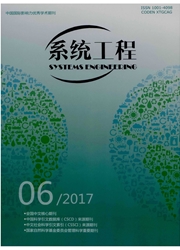

 中文摘要:
中文摘要:
通过建立垄断厂商与策略型消费者间的两周期动态博弈模型,研究了消费者策略行为下,再制造生产模式的选择决策、产品策略及动态定价问题。研究表明:第一,厂商在进行再制造生产模式的引入决策时,需要在再制造模式带来成本节约和加剧消费者策略性等待之间进行权衡。当回收率较低时,厂商须进一步压低再制品的生产成本。第二,废旧产品回收率影响再制品的定价及销售策略。随着再制造生产成本的下降,产品策略为开始仅提供新产品,然后同时提供新产品和再制品,最后仅提供再制品。第三,两种(制造/再制造)生产模式下,最优定价策略均为一条降价路径。
 英文摘要:
英文摘要:
This paper proposes two-period dynamic game model of monopoly seller and strategic consumers, and analyzes the remanufacturing production mode selection, product marketing and dynamic pricing strategies. Research results are as follows: First, seller should trade off the relationship between cost savings from remanufacturing and the strength of strategic behavior. When the recovery rate is lower, sellers need to further reduce the production costs of remanufacturing. Second, the pricing and products strategies are affected by recovery rate. With the decline of remanufacturing costs, the products strategy is from offering new products only, to both new products and remanufactured products, and remanufactured products only. Third, under both (manufacturing/remanufacturing) production modes, optimal pricing strategy is price reduction path.
 同期刊论文项目
同期刊论文项目
 同项目期刊论文
同项目期刊论文
 期刊信息
期刊信息
